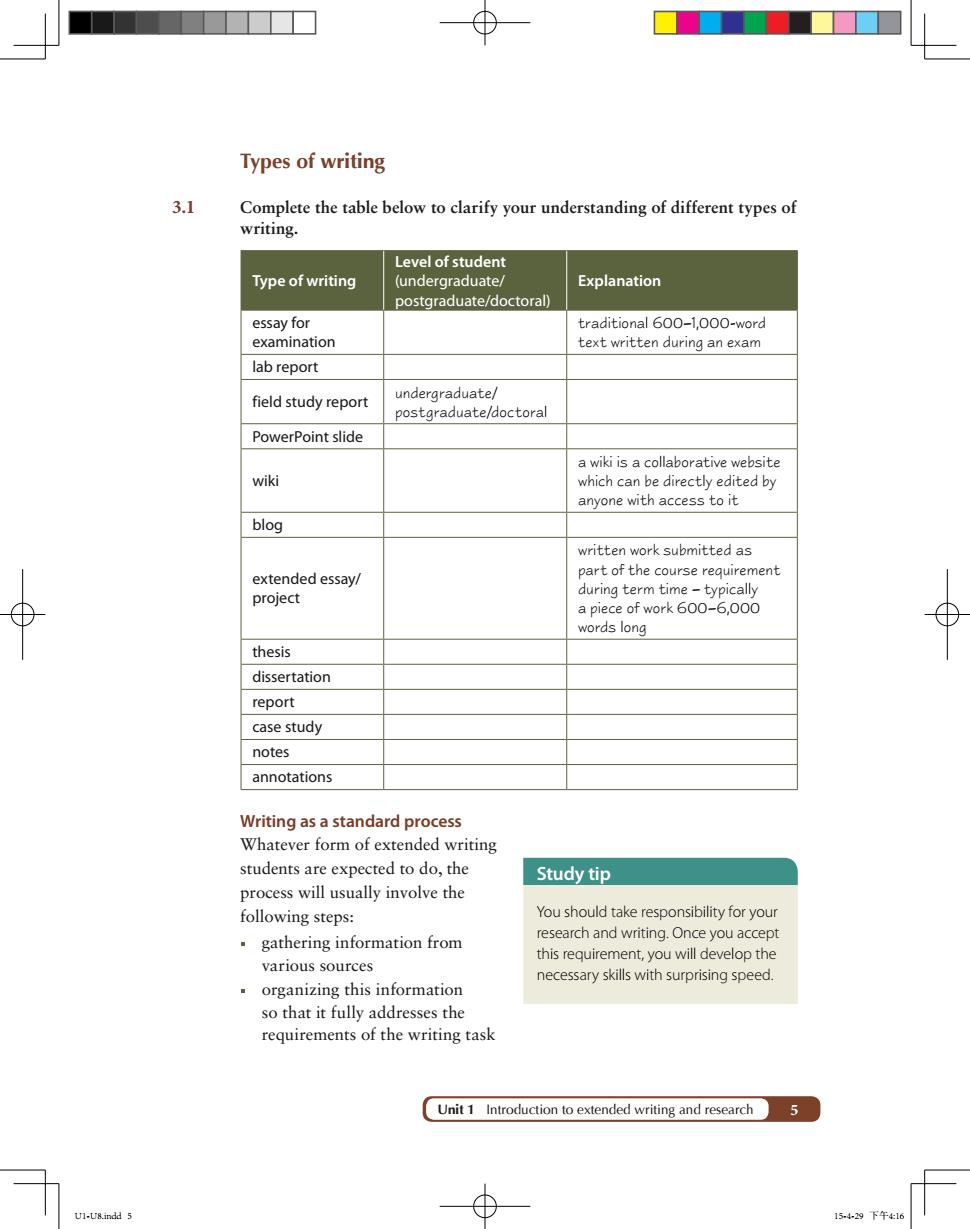
■ Types of writing 31 Complete the table below to clarify your understanding of different types of writing. Level of student Type of writing undergraduate Explanation postgraduate/doctoral) essay for traditional 600-1,000-word examination text written during an exam lab report field study report undergraduate/ postgraduate/doctoral PowerPoint slide wiki anvone with access to it blog written work submitted as artgthencoeero ment thesis dissertation report case study notes annotations Writing as a standard process Whatever form of extended writing students are expected to do,the Study tip process will usually involve the following steps: You should take responsibility for you gathering information from ent, evelop various sources ecessary skils with surprising speed organizing this information so that it fully addresses the requirements of the writing task Unit 1 Introduction to extended writing and research
Task 3 Types of writing 3.1 Complete the table below to clarify your understanding of different types of writing. Type of writing Level of student (undergraduate/ postgraduate/doctoral) Explanation essay for examination traditional 600–1,000-word text written during an exam lab report field study report undergraduate/ postgraduate/doctoral PowerPoint slide wiki a wiki is a collaborative website which can be directly edited by anyone with access to it blog extended essay/ project written work submitted as part of the course requirement during term time – typically a piece of work 600–6,000 words long thesis dissertation report case study notes annotations Writing as a standard process Whatever form of extended writing students are expected to do, the process will usually involve the following steps: gathering information from various sources organizing this information so that it fully addresses the requirements of the writing task Study tip You should take responsibility for your research and writing. Once you accept this requirement, you will develop the necessary skills with surprising speed. Unit 1 Introduction to extended writing and research 5 U1-U8.indd 5 15-4-29 下午4:16
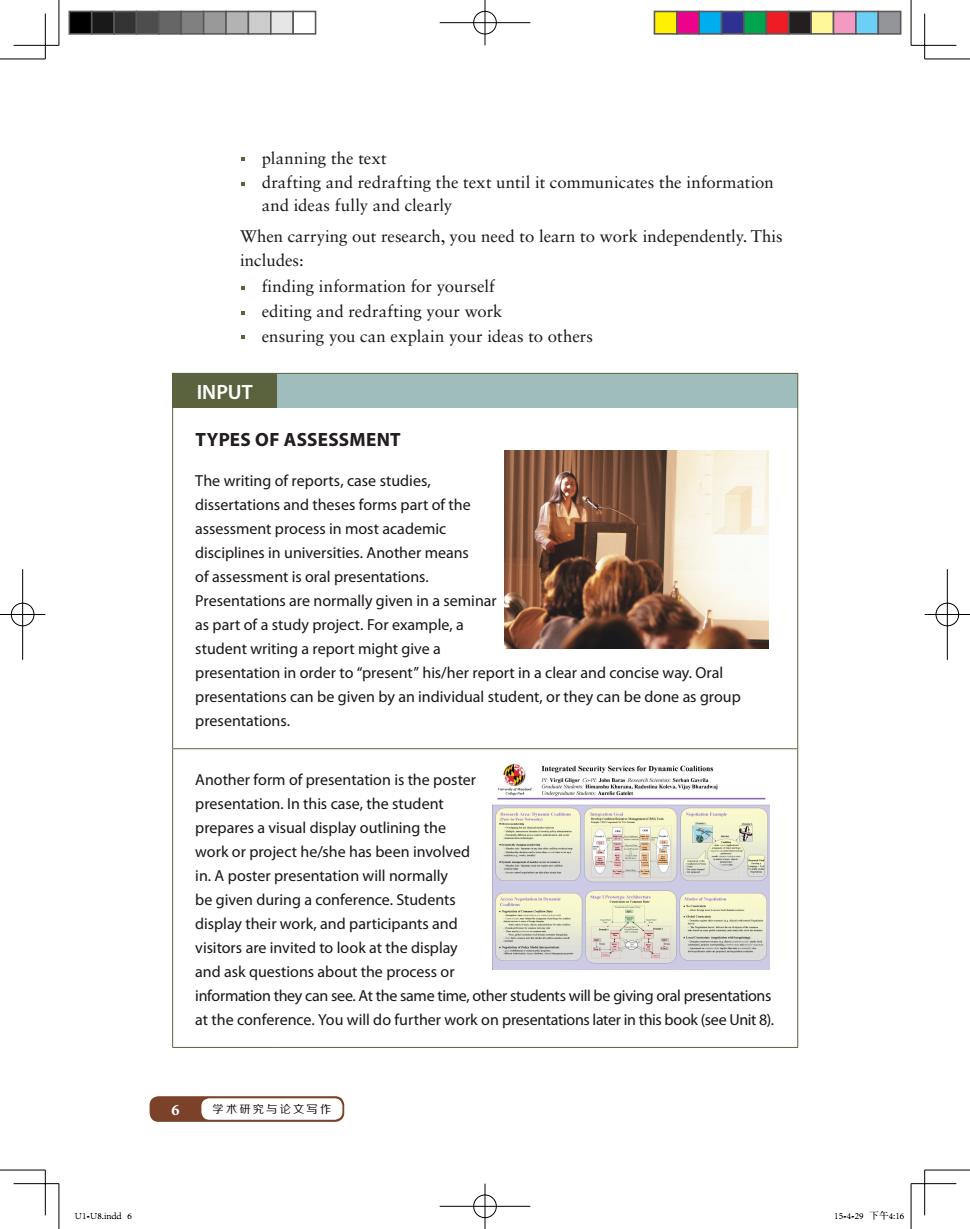
■ .planning the text When carrying out research,you need to learn to work independently.This includes: finding information for yourself .editing and redrafting your work ensuring you can explain your ideas to others INPUT TYPES OF ASSESSMENT The writing of reports,case studies. dissertations and theses forms part of the assessment process in most academic disciplines in universities.Another means of assessment is oral presentations. Presentations are normally given in a semi as part of a study project.For example,a student writing a report might give a presentation in order to"present"his/her report in a clear and concise way.Oral presentations can be given by an individual student,or they can be done as group presentations. Another form of presentation is the poster presentation.In this case,the student prepares a visual display outlining the work or project he/she has been involved n.A poster presentation will normally be given during a conference.Students display their work,and participants and visitors are invited to look at the display and ask questions about the process or information they can see.at the same time.other students will be giving oral presentation at the conference.You will do further workon presentatic ions late ook(see Unit 8 6学术研究与论文写作 5.29下午16
planning the text drafting and redrafting the text until it communicates the information and ideas fully and clearly When carrying out research, you need to learn to work independently. This includes: finding information for yourself editing and redrafting your work ensuring you can explain your ideas to others INPUT TYPES OF ASSESSMENT The writing of reports, case studies, dissertations and theses forms part of the assessment process in most academic disciplines in universities. Another means of assessment is oral presentations. Presentations are normally given in a seminar as part of a study project. For example, a student writing a report might give a presentation in order to “present” his/her report in a clear and concise way. Oral presentations can be given by an individual student, or they can be done as group presentations. Another form of presentation is the poster presentation. In this case, the student prepares a visual display outlining the work or project he/she has been involved in. A poster presentation will normally be given during a conference. Students display their work, and participants and visitors are invited to look at the display and ask questions about the process or information they can see. At the same time, other students will be giving oral presentations at the conference. You will do further work on presentations later in this book (see Unit 8). Apart from the methods of written and oral assessment mentioned above, students will probably have to take exams at the end of term and/or the end of the year, as well as at the end of their university studies, when they take their final examinations. Task 4 Extended writing This course is designed to help you apply the skills and strategies you have already studied and developed in more general writing and reading classes, i.e., skills such as skimming and scanning, structuring an essay and writing a conclusion. You will do most of the extended writing for this course independently – outside of the classroom – as a project. Any writing that occurs in the classroom will normally be for editing purposes, when you have an opportunity to consult your tutor and redraft your work accordingly. You will be expected to follow a process writing approach. This approach includes editing your work, submitting your first draft and redrafting the extended writing project after your tutor has given you feedback. Many students have the opportunity to take part in one-to-one tutorials to discuss the first and subsequent drafts of any extended writing they are working on. 4.1 Discuss with another student what you understand by the process writing approach. 4.2 Write three aspects of your project you could discuss with your tutor. 1. how to write an appropriate introduction and conclusion 2. 3. 4. 6 学 术 研究与论文写作 U1-U8.indd 6 15-4-29 下午4:16
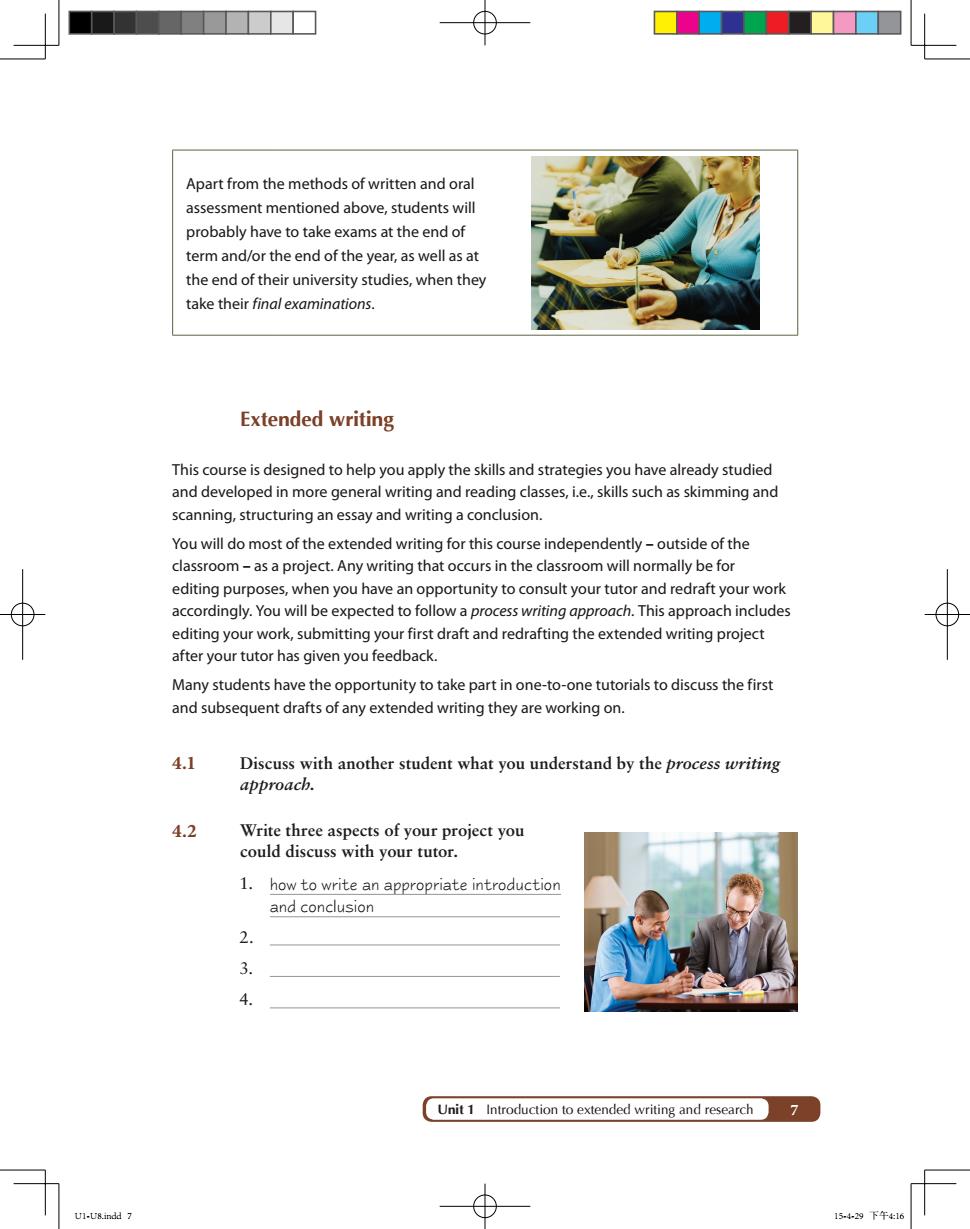
■ Apart from the methods of written and oral assessment mentioned above,students will probably have to take exams at the end of term and/or the end of the year,as well as at the end of their university studies,when they take their final examinations. Extended writing This course is designed to help you apply the skills and strategies you have already studied and developed in more general writing and reading classes,i.e.skills such as skimming and scanning,structuring an essay and writing a conclusion You will do most of the extended writing for this course independently -outside of the classroom-as a project.Any writing that occurs in the classro m will nor nally be for editing pur poses, en you have an opportunity to consult your tuto or and edraf t your worl ⊕ accordingly.You will be expected to follow a process writing approach.This approach include editing your work,submitting your first draft and redrafting the extended writing project after your tutor has given you feedback. Many students have the opportunity to take part in one-to-one tutorials to discuss the first and subsequent drafts of any extended writing they are working on. Discuss with another student what you understand by the process writing approach. 4.2 Write three aspects of your project you could discuss with your tutor. 1.how to write an appropriate introduction and conclusion Unit 1 Introduction to extended writing and research
Apart from the methods of written and oral assessment mentioned above, students will probably have to take exams at the end of term and/or the end of the year, as well as at the end of their university studies, when they take their final examinations. Task 4 Extended writing This course is designed to help you apply the skills and strategies you have already studied and developed in more general writing and reading classes, i.e., skills such as skimming and scanning, structuring an essay and writing a conclusion. You will do most of the extended writing for this course independently – outside of the classroom – as a project. Any writing that occurs in the classroom will normally be for editing purposes, when you have an opportunity to consult your tutor and redraft your work accordingly. You will be expected to follow a process writing approach. This approach includes editing your work, submitting your first draft and redrafting the extended writing project after your tutor has given you feedback. Many students have the opportunity to take part in one-to-one tutorials to discuss the first and subsequent drafts of any extended writing they are working on. 4.1 Discuss with another student what you understand by the process writing approach. 4.2 Write three aspects of your project you could discuss with your tutor. 1. how to write an appropriate introduction and conclusion 2. 3. 4. Unit 1 Introduction to extended writing and research 7 U1-U8.indd 7 15-4-29 下午4:16
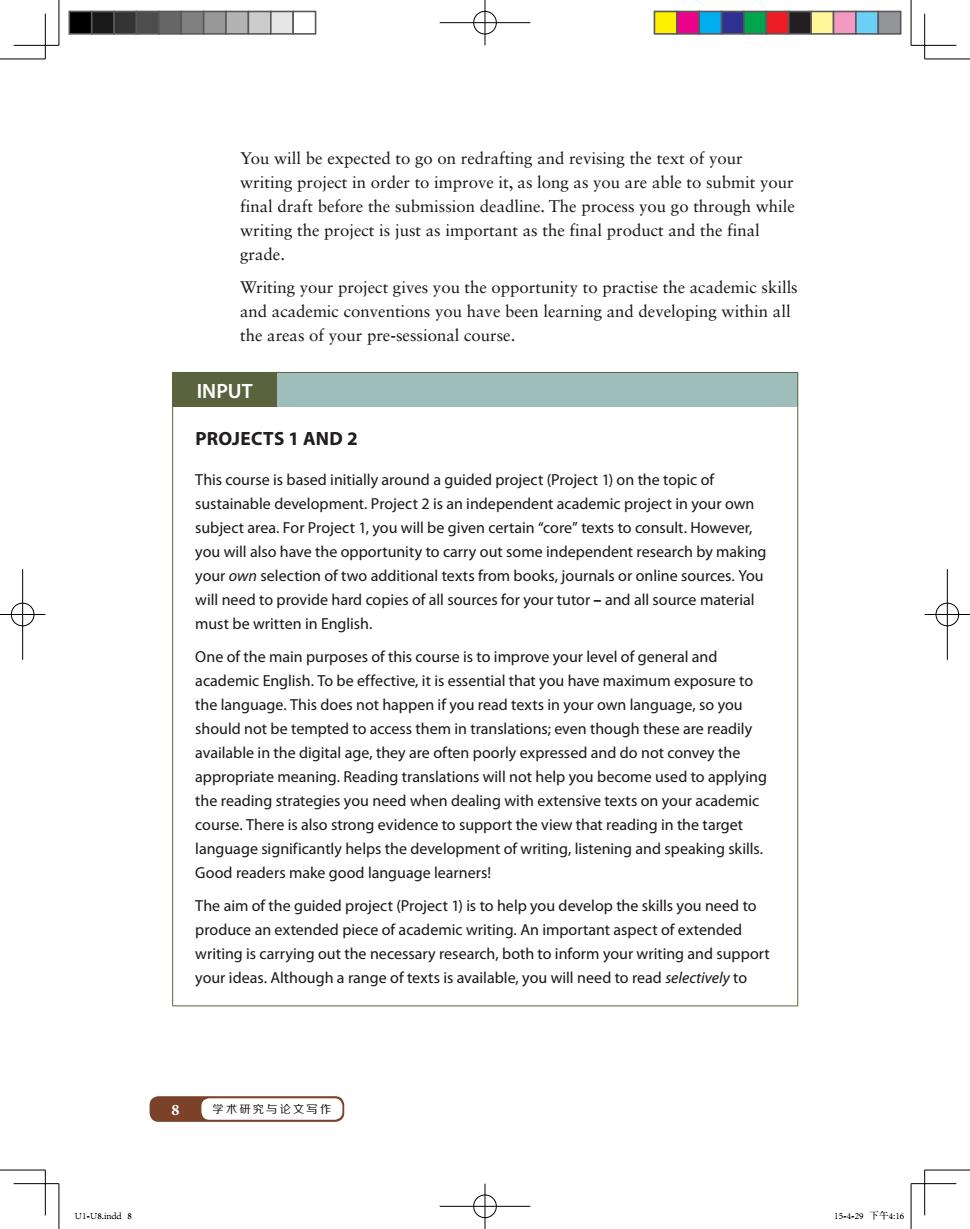
■■ You will be expected to go on redrafting and revising the text of your t in order to improve it,as long as you are able to submit your e isii.The pe writing the project is just as important as the final product and the final grade. Writing your project gives you the opportunity to practise the academic skills and academic conventions you have been learning and developing within all the areas of your pre-sessional course. INPUT PROJECTS 1 AND 2 This course is based initially around a guided project(Project 1)on the topic of sustainable development.Project 2 is an independent academic project in your own subject area.For Project 1.you will be given certaincore"texts to consult.However you will also have the opportunity to carry out some independent research by making your own selection of two additional texts from books,journals or online sources.You will need to provide hard copies of all sources for your tutor-and all source material must be written in English. One of the main purposes of this course is to improve your level of general and academic English.To be effective,it is essential that you have maximum exposure to the language.This does not happen if you read texts in your own language,so you should not be tempted to access them in translations;even though these are readily available in the digital age,they are often poorly expressed and do not convey the appropriate meaning.Reading translations will not help you become used to applying the reading strategies you need when dealing with extensive texts on your academi course.There is also strong evidence to support the view that reading in the target language significantly helps the development of writing.listening and speakina skills Good readers make good language learners! The aim of the guided project(Project 1)is to help you develop the skills you need to produce an extended piece of academic writing.An important aspect of extended writing is carrying out the necessary research,both to inform your writing and support your ideas.Although a range of texts is available,you will n ed to read selectively to 8学术研究与论文写作 1549下午e6
You will be expected to go on redrafting and revising the text of your writing project in order to improve it, as long as you are able to submit your final draft before the submission deadline. The process you go through while writing the project is just as important as the final product and the final grade. Writing your project gives you the opportunity to practise the academic skills and academic conventions you have been learning and developing within all the areas of your pre-sessional course. INPUT PROJECTS 1 AND 2 This course is based initially around a guided project (Project 1) on the topic of sustainable development. Project 2 is an independent academic project in your own subject area. For Project 1, you will be given certain “core” texts to consult. However, you will also have the opportunity to carry out some independent research by making your own selection of two additional texts from books, journals or online sources. You will need to provide hard copies of all sources for your tutor – and all source material must be written in English. One of the main purposes of this course is to improve your level of general and academic English. To be effective, it is essential that you have maximum exposure to the language. This does not happen if you read texts in your own language, so you should not be tempted to access them in translations; even though these are readily available in the digital age, they are often poorly expressed and do not convey the appropriate meaning. Reading translations will not help you become used to applying the reading strategies you need when dealing with extensive texts on your academic course. There is also strong evidence to support the view that reading in the target language significantly helps the development of writing, listening and speaking skills. Good readers make good language learners! The aim of the guided project (Project 1) is to help you develop the skills you need to produce an extended piece of academic writing. An important aspect of extended writing is carrying out the necessary research, both to inform your writing and support your ideas. Although a range of texts is available, you will need to read selectively to find information that is relevant to the task title. You will need to take notes, or highlight key points from those sources, and use them as the basis for summarizing and including these ideas in your project. The guided project should be considered practice for a second project related to your own subject area (Project 2). For this project, you should make most of the decisions about the topic and title, and you will carry out the research independently (including the search for appropriate sources). Note: Your teacher might decide not to do Project 1 and simply make use of the practice activities to develop the necessary skills for completing Project 2 on a topic related to your own field of study. Task 5 Writing a project There are three stages in producing an extended essay or project: planning, researching and writing up. In each of these stages, there are a number of smaller steps. 5.1 Read steps 1–16 below. Then write them under the appropriate stage headings on page 10, Planning, Researching or Writing up, in the appropriate order. Write the steps in full, not just the letters. 1. Read the first draft. 2. Edit the draft – decide objectively whether your ideas have been expressed clearly. 3. Think of a working title for the project. ✔ 4. Search for relevant journals/books/information in the library and on the Internet. 5. Write down the details of your sources. 6. Decide if you need to do more reading. 7. Write the contents page, bibliography, title page and abstract. 8. Arrange a tutorial with your tutor. 9. Do some reading. ✔ 10. Decide on a topic. 11. Write the first complete draft. ✔ 12. Highlight/take notes of the relevant information. 8 学 术 研究与论文写作 U1-U8.indd 8 15-4-29 下午4:16
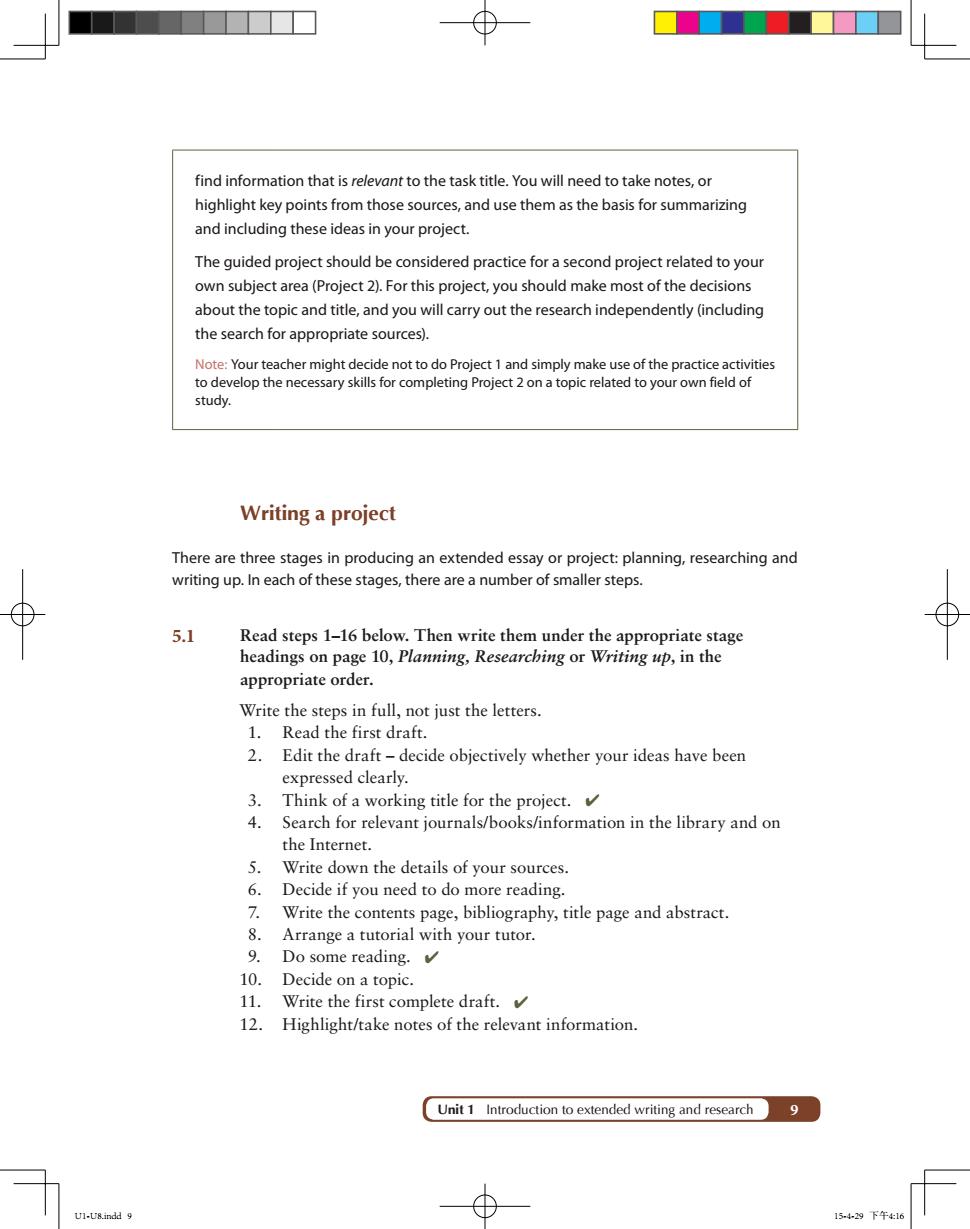
find information that is relevant to the task title.You will need to take notes,or highlight key points from those sources,and use them as the basis for summarizing and including these ideas in your project. The quided project should be considered practice for a second project related to your own subject area(Project 2).For this project,you should make most of the decisions about the topic and title,and you will carry out the research independently(including the search for appropriate sources). Note:Your teacher might decide not to do Project 1 and simply make use of the practice activities tdvelop the necessary sklls tor completing Projectona topicrelated to your own neld of Writing a project There are three stages in producing an extended essay or project:planning,researching and writing up.In each of these stages,there are a number of smaller steps. Read steps 1-16 below.Then write them under the appropriate stage headings on page 10,Planning,Researching or Writing up,in the appropriate order. Write the steps in full,not just the letters. 1 Read the first draft. 2. Edit the draft decide objectively whether your ideas have been expressed clearly. 3 Think of a working title for the project. 4.Search for relevant journals/books/information in the library and on the internet. 5. Write down the details of your sources 67 Decide if you need to do reading Write the,tite page and abstract. Arrange a tutorial with your tutor. 9. Do some reading. 10.Decide on a topic. 11.Write the first complete draft. 12.Highlight/take notes of the relevant information Unit 1 Introduction to extended writing and research
find information that is relevant to the task title. You will need to take notes, or highlight key points from those sources, and use them as the basis for summarizing and including these ideas in your project. The guided project should be considered practice for a second project related to your own subject area (Project 2). For this project, you should make most of the decisions about the topic and title, and you will carry out the research independently (including the search for appropriate sources). Note: Your teacher might decide not to do Project 1 and simply make use of the practice activities to develop the necessary skills for completing Project 2 on a topic related to your own field of study. Task 5 Writing a project There are three stages in producing an extended essay or project: planning, researching and writing up. In each of these stages, there are a number of smaller steps. 5.1 Read steps 1–16 below. Then write them under the appropriate stage headings on page 10, Planning, Researching or Writing up, in the appropriate order. Write the steps in full, not just the letters. 1. Read the first draft. 2. Edit the draft – decide objectively whether your ideas have been expressed clearly. 3. Think of a working title for the project. ✔ 4. Search for relevant journals/books/information in the library and on the Internet. 5. Write down the details of your sources. 6. Decide if you need to do more reading. 7. Write the contents page, bibliography, title page and abstract. 8. Arrange a tutorial with your tutor. 9. Do some reading. ✔ 10. Decide on a topic. 11. Write the first complete draft. ✔ 12. Highlight/take notes of the relevant information. Unit 1 Introduction to extended writing and research 9 U1-U8.indd 9 15-4-29 下午4:16